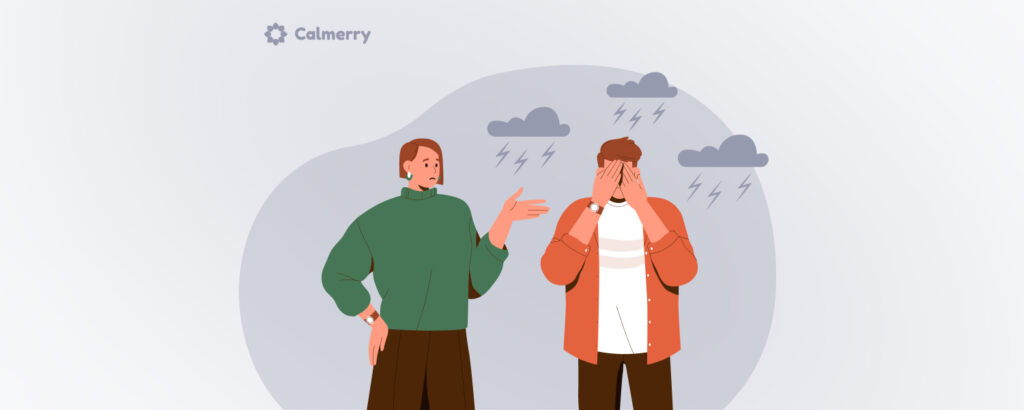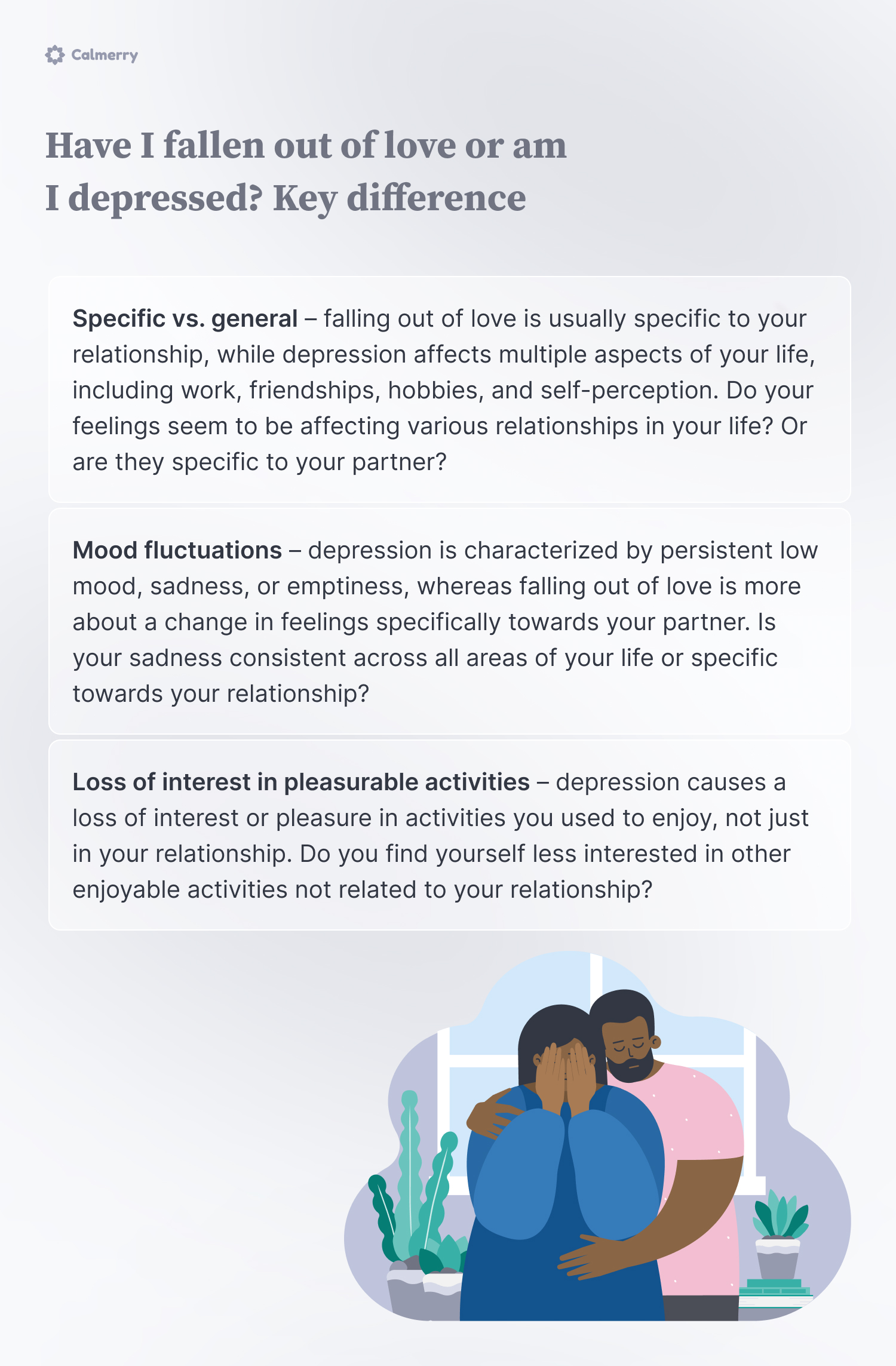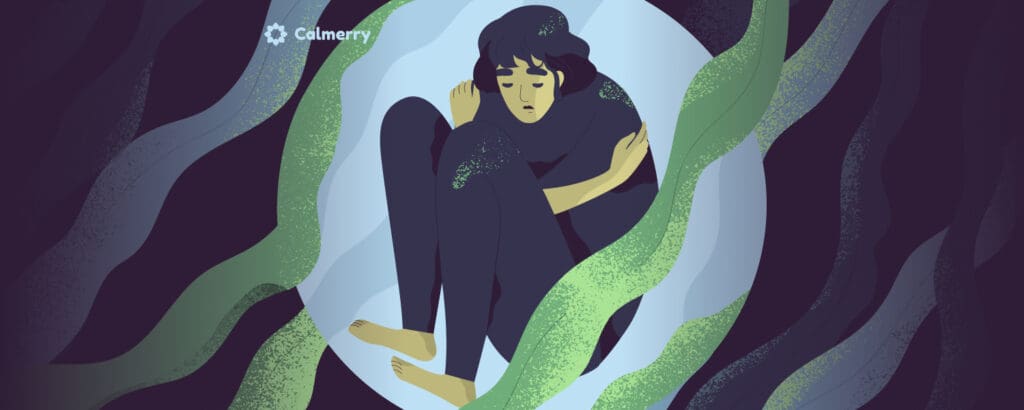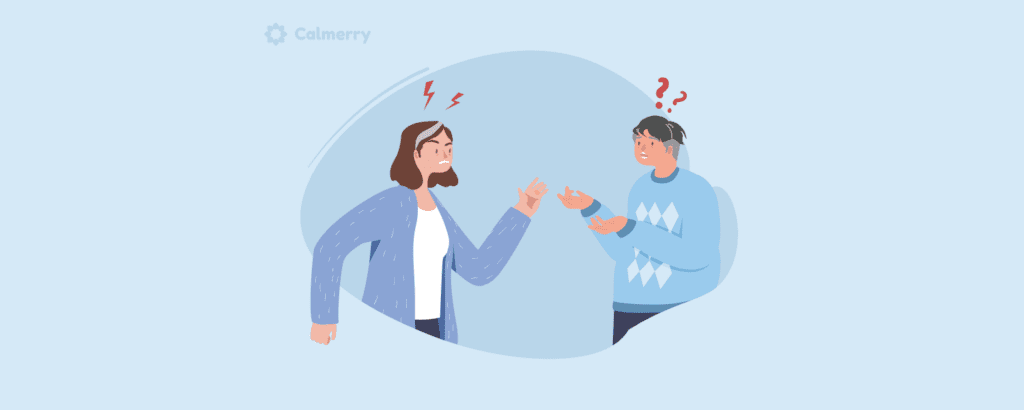Have I Fallen Out of Love or Am I Depressed?

In this article
In the diversity of human emotions, the threads of love and depression often intertwine, presenting a complex pattern that can be challenging to decipher.
Understanding the nuances between depression and falling out of love is crucial. These emotional states, while distinct, can mimic each other in ways that blur lines and confuse our understanding of our own hearts and minds.
The interplay of love and depression
Depression is a complex mental health condition that can significantly impact your emotional state, including your feelings of love and attachment.
But does depression affect your ability to love? It’s possible that depression can affect the way you experience emotions, such as love and affection.
Here are some ways in which depression can affect these aspects:
Diminished emotional responsiveness
Depression often leads to a general dulling of emotions or emotional numbness. [1] Goodwin, G. M., Price, J., De Bodinat, C., & Laredo, J. (2017). Emotional blunting with antidepressant treatments: A survey among depressed patients. Journal of Affective Disorders, 221, 31–35. https://doi.org/10.1016/j.jad.2017.05.048 If you have depression, you might find it harder to experience joy, excitement, and even love.
These dampened emotions can make it difficult for you to feel or express love and affection towards others, including close family and friends.
Altered perception of relationships
Depression can alter your perception of your relationships. [2] Vujeva, H., & Furman, W. (2011). Depressive Symptoms and Romantic Relationship Qualities from Adolescence Through Emerging Adulthood: A Longitudinal Examination of Influences. Journal of Clinical Child and Adolescent Psychology, 40(1), 123–135. https://doi.org/10.1080/15374416.2011.533414 You may feel unloved or believe that your loved ones would be better off without you.
This altered perception can lead to misunderstandings and conflicts in relationships.
Difficulty in maintaining relationships and impaired communication
The symptoms of depression, such as low energy, irritability, and lack of interest in activities, can make it challenging to maintain relationships. The effort required to engage in social interactions may feel overwhelming, leading to neglected relationships.
Communication is also vital in relationships, but depression can impair this. You might struggle to articulate your feelings, leading to misunderstandings and feelings of disconnect with loved ones.

Impact on physical intimacy
Depression can also affect physical aspects of relationships, including intimacy.
Reduced libido is a common symptom of depression that can impact your desire for physical closeness, which can be an important aspect of romantic relationships. [3] Professional, C. C. M. (n.d.). Depression and sex. Cleveland Clinic. https://my.clevelandclinic.org/sexual-problems-and-depression
– Veronica Silver, Therapist-turned mental health writer
These effects can vary greatly from person to person. While depression may not be the exact cause of falling out of love, it may impact intimacy, affection, and attachment.
Open communication and understanding within relationships can play a crucial role in managing the effects of depression on love and attachment.
Signs you might be falling out of love
Differentiating between falling out of love and symptoms of depression can be challenging, as both experiences can share some overlapping signs. It can make you wonder, “Am I losing feelings or am I depressed?”
However, there are distinct characteristics for each. Understanding these differences is crucial for addressing the issues appropriately.
- Lack of emotional connection – you may feel emotionally disconnected from your partner, not sharing the same level of intimacy or understanding as before.
- Indifference – where there used to be strong emotions (positive or negative), there’s now indifference. You might not care as much about what your partner does or feels.
- Avoidance of time together – unlike being busy or occasionally needing space, consistently preferring to spend time away from your partner can be a sign of falling out of love.
- No longer planning for the future – if you’ve stopped making plans or thinking about your shared future, it might indicate a loss of interest in continuing the relationship.
- Their imperfections stand out – the quirks that you may once have found charming or loveable might start to become more irritating, which could mean you’re falling out of love.
- Constant irritation or criticism – finding yourself frequently irritated by your partner or overly critical of them can be a sign that your feelings have changed.
- Feeling happier alone – constantly feeling happier or more relaxed when your partner is not around might indicate a shift in your feelings.
Differentiating from depression symptoms
While the experience of falling out of love may overlap with depression, there are ways to determine whether it is depression that may be making you feel this way.
- Specific vs. general – falling out of love is usually specific to your relationship, while depression affects multiple aspects of your life, including work, friendships, hobbies, and self-perception. Do your feelings seem to be affecting various relationships in your life? Or are they specific to your partner?
- Mood fluctuations – depression is characterized by persistent low mood, sadness, or emptiness, whereas falling out of love is more about a change in feelings specifically towards your partner. [4] Depression. (n.d.). National Institute of Mental Health (NIMH). https://www.nimh.nih.gov/health/topics/depression Is your sadness consistent across all areas of your life or specific towards your relationship?
- Loss of interest in pleasurable activities – depression causes a loss of interest or pleasure in activities you used to enjoy, not just in your relationship. Do you find yourself less interested in other enjoyable activities not related to your relationship?
If you’re experiencing any of these signs, it’s important to reflect on whether these feelings are confined to your relationship or extend to other areas of your life.
Seek professional help if you suspect you’re struggling with depression.
It’s normal for relationships to go through phases, and feelings can change over time. However, persistent feelings of detachment or unhappiness in a relationship should be addressed thoughtfully.
– Veronica Silver, Therapist-turned mental health writer
Can depression make you fall out of love?
Depression might not be the direct cause of you losing feelings for your partner, but it can significantly impact how you perceive your relationship and your feelings for your partner. [5] Sharabi, L. L., Delaney, A. L., & Knobloch, L. K. (2015). In their own words. Journal of Social and Personal Relationships, 33(4), 421–448. https://doi.org/10.1177/0265407515578820
Depression can create conditions that make it feel as though love or affection has diminished.
– Veronica Silver, Therapist-turned mental health writer
Here’s how depression can alter your perception of your partner and the relationship, which may lead to falling out of love:
Negative thought patterns
Depression can skew thinking into more negative patterns. [6] Outreach. (2022, July 29). Breaking the cycle: negative thought patterns and depression. Sage Neuroscience Center. https://sageclinic.org/blog/negative-thoughts-depression/ A person might start focusing on the negatives of the relationship or magnify small issues, leading to a distorted view of the partner and the relationship. These negative thought patterns can make it seem like the love they once felt is no longer there.
Anhedonia (loss of pleasure)
Anhedonia, or the inability to feel pleasure in normally pleasurable activities, is a common symptom of depression. This can extend to the relationship, making enjoyable moments with a partner feel flat or unfulfilling, which might be mistaken for falling out of love.
Altered self-perception
Depression often brings about feelings of worthlessness or low self-esteem. A person might feel unworthy of love or believe they are a burden to their partner. These feelings can lead to pushing the partner away, which can be misinterpreted as a loss of feelings.
Fatigue and irritability
These common symptoms of depression can lead to a lack of patience and increased irritability with a partner. Over time, this can strain the relationship and might be mistaken for falling out of love.
Projection
Sometimes, a person with depression might project their own feelings of inadequacy or unhappiness onto their partner, believing that the partner is the source of these feelings.
It’s crucial to differentiate between the actual loss of love and the effects of depression on a relationship to avoid relationship crises. In many cases, treating depression can lead to a renewed perspective on the relationship and a rediscovery of feelings that seemed lost.
How to feel love again after depression
Recovering from depression can often lead to significant improvements in personal relationships and might help rekindle feelings of love. When depression lifts, the changes in perception, emotion, and behavior can positively affect how you feel about and interact with your partner.
As depression recedes, the emotional numbness diminishes. This can lead to a reawakening of feelings, including love and affection, that were suppressed by depression.
– Veronica Silver, Therapist-turned mental health writer
Recovery from depression can also enhance communication skills. Being able to express feelings and thoughts more clearly can strengthen the connection you’re your partner.
Overcoming depression typically brings back energy and interest in activities, including those shared with your partner. This can reignite shared joy and bonding. And this can also restore libido and desire for physical closeness leading to an increase in intimacy.
- Self-reflection and honesty – first, it’s crucial to reflect honestly on your feelings. Distinguishing between the effects of depression and actual feelings towards your partner is important.
- Seek professional help – if you suspect you’re experiencing depression, consult a mental health professional. They can help diagnose your condition and recommend depression therapy.
- Open communication with your partner – discuss your feelings with your partner. This might not only provide relief but can also help your partner understand your situation better.
- Engage in couple’s therapy – if the lines between depression and feelings for your partner are blurred, couple’s therapy can be beneficial. It provides a safe space to explore these feelings under professional guidance.
- Prioritize self-care – focus on self-care practices that improve mental health, such as exercise, a healthy diet, adequate sleep, and stress management. [7] Caring for your mental health. (n.d.). National Institute of Mental Health (NIMH). https://www.nimh.nih.gov/caring-for-your-mental-health
- Give it time – recognize that both recovering from depression and reassessing feelings in a relationship take time. Patience is key.
- Re-engage in shared activities – participating in activities you both enjoy can help reignite feelings of love and joy in the relationship.
- Set realistic expectations – understand that relationships evolve over time, and it’s normal for feelings to change. Keeping realistic expectations about love and relationships is important.
The journey of recovery from depression and navigating relationship dynamics is highly individual. It’s important to approach these issues with compassion and understanding, both for yourself and your partner.
Seeking professional help
Therapy plays a pivotal role in diagnosing and addressing complex emotions associated with relationships and depression. It provides a professional perspective to distinguish between emotional states and mental health conditions and offers clarity on underlying issues.
Therapists create a safe, confidential space for individuals to explore and express their feelings without judgment. This environment is essential for honest self-exploration and understanding.
Therapy aids in processing complex emotions, whether related to relationship dynamics or symptoms of depression, guiding individuals in understanding and articulating their feelings.
For couples, therapy can significantly improve relationship dynamics, focusing on mutual understanding, conflict resolution, and strengthening emotional connections.
For your convenience, you can seek out individual online therapy at Calmerry for a more flexible option. We will match you with an expert or your unique needs within 1 hour.
Goodwin, G. M., Price, J., De Bodinat, C., & Laredo, J. (2017). Emotional blunting with antidepressant treatments: A survey among depressed patients. Journal of Affective Disorders, 221, 31–35. https://doi.org/10.1016/j.jad.2017.05.048
Vujeva, H., & Furman, W. (2011). Depressive Symptoms and Romantic Relationship Qualities from Adolescence Through Emerging Adulthood: A Longitudinal Examination of Influences. Journal of Clinical Child and Adolescent Psychology, 40(1), 123–135. https://doi.org/10.1080/15374416.2011.533414
Professional, C. C. M. (n.d.). Depression and sex. Cleveland Clinic. https://my.clevelandclinic.org/sexual-problems-and-depression
Depression. (n.d.). National Institute of Mental Health (NIMH). https://www.nimh.nih.gov/health/topics/depression
Sharabi, L. L., Delaney, A. L., & Knobloch, L. K. (2015). In their own words. Journal of Social and Personal Relationships, 33(4), 421–448. https://doi.org/10.1177/0265407515578820
Outreach. (2022, July 29). Breaking the cycle: negative thought patterns and depression. Sage Neuroscience Center. https://sageclinic.org/blog/negative-thoughts-depression/
Caring for your mental health. (n.d.). National Institute of Mental Health (NIMH). https://www.nimh.nih.gov/caring-for-your-mental-health
online therapy
live video session




